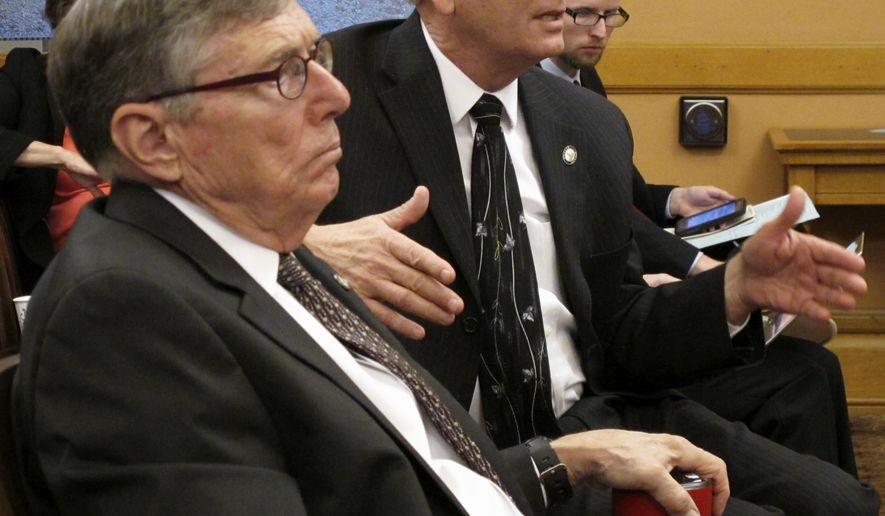TOPEKA, Kan. (AP) - Kansas legislators on Thursday rejected a proposal to raise additional revenue to fix the state’s budget problems with a “flat” personal income tax with Republicans deeply divided over the measure despite GOP Gov. Sam Brownback’s endorsement.
The Republican-controlled state Senate voted 37-3 against an income tax bill . Some of those voting no were GOP conservatives who like the idea of simplifying the state’s income code but who felt the time wasn’t right to push a plan for moving the state away from separate tax rates for lower-income earners and higher-income filers.
“This vote tells you absolutely nothing,” said conservative Republican Sen. Ty Masterson, of Andover, a flat-tax supporter who nevertheless voted against the bill.
But the Senate’s debate did demonstrate that such a bill faces strong bipartisan opposition. Democrats and moderate Republicans believe it would hit poor and middle-class taxpayers the hardest.
Supporters sought to save the bill by returning it to committee for more work, but the vote was 25-15 against the move - a good indication of the chamber’s sentiments.
“It is just plain bad policy,” said Sen. Oletha Faust-Goudeau, a Wichita Democrat. “Hard-working Kansans deserve better than this.”
Kansas faces projected budget shortfalls totaling more than $1 billion through June 2019 following massive personal income tax cuts in 2012 and 2013 championed by Brownback and slumps in agriculture and energy production. Voters last year turned on him and his conservative allies, electing more Democrats and GOP moderates.
Bipartisan majorities passed a bill in February to roll back past income tax cuts and raise more than $1 billion over two years, but Brownback vetoed it. That measure would have added a third tax bracket with a new top rate of 5.45 percent.
The bill before the Senate would have imposed a 4.6 percent rate for all filers starting next year and raised a total of $652 million over two years, starting in July.
Its single rate would mirror the current top rate for higher-income earners, and the bill would eliminate the 2.7 percent rate now in place for lower-income filers. The measure would have raised standard deductions for all filers and decrease the state’s sales tax on groceries to help poor families.
The bill also would have ended an exemption for 330,000-plus farmers and business owners. Brownback’s promise Wednesday to sign the Senate’s bill or something similar represented a major concession because he championed the exemption.
Senate tax committee Chairwoman Caryn Tyson, a Parker Republican, argued that small business owners would bear the brunt of the tax increase, not the poorest taxpayers. Many lawmakers, including fellow Republicans, saw the exemption as unfair to wage-earners and campaigned last year on repealing it.
Tyson voted against the bill. The only yes votes came Senate President Susan Wagle, of Wichita; Majority Leader Jim Denning, of Wichita; and Sen. Gene Suellentrop, of Wichita, all Republicans.
Democratic Sen. Tom Holland, of Baldwin City, said the bill wouldn’t have raised enough money to solve the state’s budget problems. As they work on closing budget shortfalls, lawmakers are considering boosting aid to the state’s public schools following a Kansas Supreme Court ruling last month that education funding is inadequate.
“This might be a fun exercise to do if we had a surplus. We don’t,” said Holland, who also viewed the bill as unfair to poor and middle-class families.
Brownback also has proposed increasing cigarette and liquor taxes. In addition, his budget proposals would authorize internal government borrowing, temporarily cancel scheduled increases in contributions to public employee pensions and divert highway funds to general government programs.
___
Follow John Hanna on Twitter at https://twitter.com/apjdhanna




Please read our comment policy before commenting.